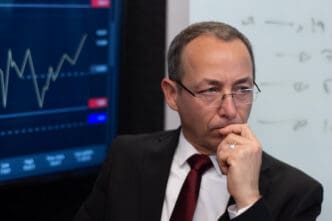Recent developments have seen global markets experience significant turmoil following the imposition of tariffs by U.S. President Donald Trump on numerous countries. The announcement of these extensive import taxes on April 2 led to sharp declines in stock markets across the United States and Asia. Although a temporary suspension of the tariffs for 90 days brought a slight recovery, market volatility has remained a concern.
The tariff announcement wiped trillions from the stock market, with billionaires among the hardest hit. High-profile figures such as Tesla and SpaceX CEO Elon Musk, Amazon CEO Jeff Bezos, and Facebook founder Mark Zuckerberg witnessed substantial reductions in their market values.
For investors concerned about their portfolios, particularly those with money in ETFs or the stock market for retirement planning, several strategies have been suggested by financial experts. Christian Nolting, Global Chief Investment Officer at Deutsche Bank’s Private Bank, and Robert Greil, Chief Strategist at Merck Finck, offer insights on navigating these turbulent times.
Consider Holding Off on Selling Stocks and Shares
Both Nolting and Greil emphasize the importance of resisting impulsive selling. They note that the worst-performing days in the stock market are often followed by the best, making it costly to miss out on potential recoveries. While staying invested is crucial for positive returns, they highlight the role of hedging and strategic asset allocation in bolstering future portfolio gains. Investors are advised to assess the risk levels of specific sectors and consult financial advisors for guidance, particularly in sectors heavily impacted by tariffs.
Investing Amidst Market Declines
Some investors see the current market volatility as an opportunity to buy low, though this strategy carries risks due to potential further declines. Despite a notable recovery since early April, markets are unlikely to sustain levels above previous highs in the short term, especially with the uncertainty of higher tariffs looming. Investors remain cautious, with many holding liquid funds as a safety measure. However, for long-term investors, there is still potential in investing in secular growth themes.
Weighing Cash vs. Stocks and Shares
Deutsche Bank does not foresee an immediate stock market crisis, and Nolting suggests maintaining cash reserves for flexibility. He advises that within a portfolio, investments in gold, the Swiss franc, and the Japanese yen may offer more stability. Hedging is recommended as a crucial strategy for portfolio security, though it may lower potential profits. Greil concurs, advocating for a diversified portfolio that includes safe investments such as gold and European government bonds.
Concerns About a Recession
While the risk of a recession has increased due to tariffs and market instability, Nolting and Greil are not sounding alarms yet. Nolting believes that avoiding a U.S. recession is possible if uncertainty is resolved and sustainable trade agreements are achieved. However, Germany’s export dependence poses challenges. For the Eurozone, modest GDP growth is anticipated through 2025 and 2026. Greil notes that although the probability of a global recession has risen, it is not the primary expectation. Quick removal of tariffs could prevent significant economic damage and avert recession.
Overall investment decisions should be tailored to an individual’s risk tolerance and investment timeline.







